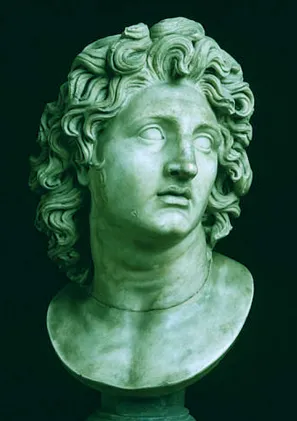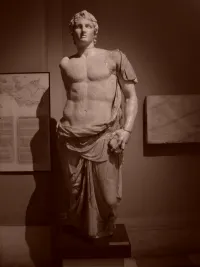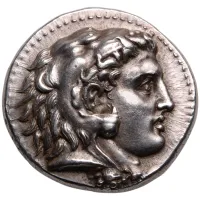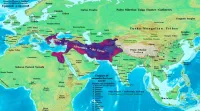Biography
356 BCE - 323 BCE
"I had rather excel others in the knowledge of what is excellent
than in the extent of my powers and dominion."
- Alexander the Great
Born in Pella in 356 BC Alexander, a student of Aristotle, ascended to his father’s throne at the age of twenty and proceeded to conquer what would become the Ottoman Empire. Undefeated in battle and considered the greatest soldier of all time, Alexander’s Hellenistic cultural impact would be felt for nearly two millennia. Though he did marry (to produce an heir), and was known to have had many paramours of both genders, the greatest relationship of his life was with his life-long friend, bodyguard – and, as most historians concede, lover – General Hephaestion – second-in-command only to Alexander himself. Alexander and Hephaestion – who grew up in a time and place when homosexuality was seen as perfectly normal – repeatedly and publicly identified themselves with Achilles and Patroclus, who were known to have been lovers. When Hephaestion succumbed to a mysterious fever, at the age of 32, Alexander threw himself upon his body, refusing to allow anyone to touch him for nearly two days. Before setting the torch to Hephaestion’s funeral pyre, Alexander shore off his own hair and, while vowing they would soon be reunited, folded the curls into his beloved’s hands as his men looked on and wept. Shaken to his core, Alexander was never quite the same. While planning a monument to memorialize Hephaestion as a god, Alexander’s health went into decline. A mere eight months after Hephaestion’s passing, overcome with grief, Alexander died. Tragically united in death, as in life, Alexander’s proto-mythic conquests – with Hephaestion at his side – have become the measure against which generals, even to this day, compare themselves. His tactical exploits are still taught at military academies throughout the world.
356 BCE - 323 BCE
"I had rather excel others in the knowledge of what is excellent
than in the extent of my powers and dominion."
- Alexander the Great
Born in Pella in 356 BC Alexander, a student of Aristotle, ascended to his father’s throne at the age of twenty and proceeded to conquer what would become the Ottoman Empire. Undefeated in battle and considered the greatest soldier of all time, Alexander’s Hellenistic cultural impact would be felt for nearly two millennia. Though he did marry (to produce an heir), and was known to have had many paramours of both genders, the greatest relationship of his life was with his life-long friend, bodyguard – and, as most historians concede, lover – General Hephaestion – second-in-command only to Alexander himself. Alexander and Hephaestion – who grew up in a time and place when homosexuality was seen as perfectly normal – repeatedly and publicly identified themselves with Achilles and Patroclus, who were known to have been lovers. When Hephaestion succumbed to a mysterious fever, at the age of 32, Alexander threw himself upon his body, refusing to allow anyone to touch him for nearly two days. Before setting the torch to Hephaestion’s funeral pyre, Alexander shore off his own hair and, while vowing they would soon be reunited, folded the curls into his beloved’s hands as his men looked on and wept. Shaken to his core, Alexander was never quite the same. While planning a monument to memorialize Hephaestion as a god, Alexander’s health went into decline. A mere eight months after Hephaestion’s passing, overcome with grief, Alexander died. Tragically united in death, as in life, Alexander’s proto-mythic conquests – with Hephaestion at his side – have become the measure against which generals, even to this day, compare themselves. His tactical exploits are still taught at military academies throughout the world.
Demography
Demography
Gender Male
Sexual Orientation Bisexual
Gender Identity Cisgender
Ethnicity Caucasian/White
Nations Affiliated Greece
Era/Epoch Antiquity/Ancient History (beginning of recorded history-476 CE)
Field(s) of Contribution
Military
Politics
Commemorations & Honors
Founded 25 Cities in Many Locales
Featured in Modern Greek Folklore
British Heavy Metal Band Iron Maiden's Album Somewhere in Time Includes the Song Alexander the Great Chronicling His Life (1986)
Demography
Gender Male
Sexual Orientation Bisexual
Gender Identity Cisgender
Ethnicity Caucasian/White
Nations Affiliated Greece
Era/Epoch Antiquity/Ancient History (beginning of recorded history-476 CE)
Field(s) of Contribution
Military
Politics
Commemorations & Honors
Founded 25 Cities in Many Locales
Featured in Modern Greek Folklore
British Heavy Metal Band Iron Maiden's Album Somewhere in Time Includes the Song Alexander the Great Chronicling His Life (1986)
Resources
Resources
Arrian. History of Alexander and Indica. Cambridge: Harvard University Press, 1976.
Curtius Rufus, Quintus. History of Alexander. Cambridge: Harvard University Press, 1946.
Peyrefitte, Roger. Alexandre le Grand. Paris : Albin Michel, 1981.
Peyrefitte, Roger. Les conquêtes d'Alexandre. Paris : Albin Michel, 1979.
Peyrefitte, Roger. La jeunesse d'Alexandre. Paris : Albin Michel, 1977.
Plutarch. The Lives of the Noble Grecians and Romans. New York: Modern Library, 1957.
Renault, Mary. The Nature of Alexander. London : Allen Lane, 1975.
http://www.gayheroes.com/alex.htm
https://bi.org/en/famous/alexander-the-great
https://scholarspace.library.gwu.edu/concern/gw_works/w9505070k
https://manchesterhistorian.com/2021/alexander-the-great-lgbt-icon-by-alexandra-birch/
https://www.netflix.com/tudum/articles/alexander-making-of-a-god-release-date-trailer-news
Resources
Arrian. History of Alexander and Indica. Cambridge: Harvard University Press, 1976.
Curtius Rufus, Quintus. History of Alexander. Cambridge: Harvard University Press, 1946.
Peyrefitte, Roger. Alexandre le Grand. Paris : Albin Michel, 1981.
Peyrefitte, Roger. Les conquêtes d'Alexandre. Paris : Albin Michel, 1979.
Peyrefitte, Roger. La jeunesse d'Alexandre. Paris : Albin Michel, 1977.
Plutarch. The Lives of the Noble Grecians and Romans. New York: Modern Library, 1957.
Renault, Mary. The Nature of Alexander. London : Allen Lane, 1975.
http://www.gayheroes.com/alex.htm
https://bi.org/en/famous/alexander-the-great
https://scholarspace.library.gwu.edu/concern/gw_works/w9505070k
https://manchesterhistorian.com/2021/alexander-the-great-lgbt-icon-by-alexandra-birch/
https://www.netflix.com/tudum/articles/alexander-making-of-a-god-release-date-trailer-news




